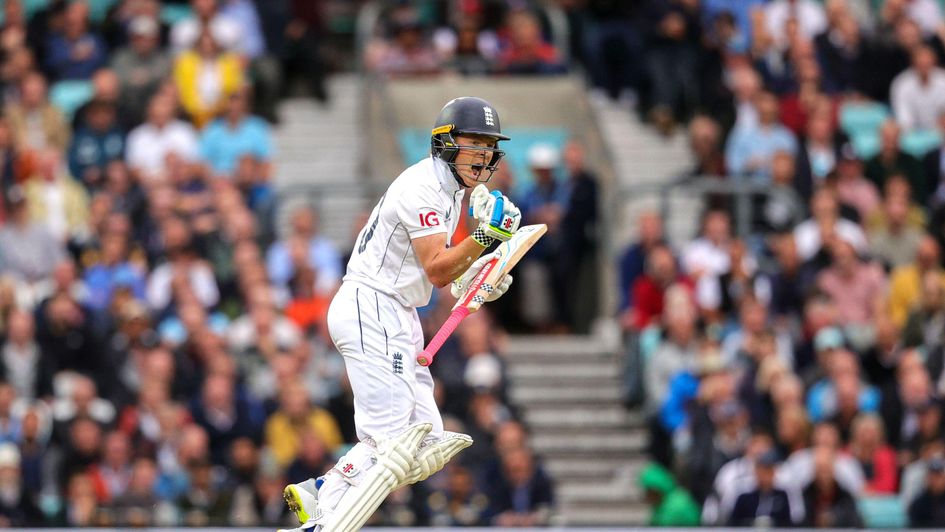Richard Mann reflects on England's Test summer following their disappointing defeat to Sri Lanka at the Oval, picking up on some of the key talking points.
Are England ruthless enough?
When England last won an Ashes series Down Under, in 2010/2011, the Andrew Strauss-led side posted first-innings scores of 620-5 declared, 513 and 644, as well as 517-1 declared in the second innings of the first Test in Brisbane.
That famous series victory was built on big runs – a tried and tested method in Australia. It’s something England have talked about on their subsequent tours of Australia but have been unable to manage, in part because of their own deficiencies, and also because of the continued excellence of the home attack.
There is a new confidence about England’s Test cricket since Bazball came onto the scene, Brendon McCullum and Ben Stokes apparently transforming the team's batting in particular. Timid old England has been replaced with a braver, more aggressive version that has largely been successful.
England more than matched Australia in last summer’s home Ashes series, winning the final Test to secure a 2-2 draw. This summer has gone just about to plan, with a 3-0 clean sweep over West Indies and a 2-1 series win against Sri Lanka.
But we must remember that the level of opposition seen in the last few weeks will be nothing like facing Pat Cummins and co on their home patch next winter, or India before that next summer, and the need to be ruthless with the bat will be crucial.
It’s here where I’d have serious concerns about this team. England haven’t scored 500 once all summer, and though they have posted in excess of 400 on three occasions, along with plenty of other 300+ scores, they have been wasteful on a number of occasions.

On a series of flat pitches against moderate opposition, I don’t think they’ve shown anywhere near the level of ruthlessness that will be required to win against the best sides, particularly away from home, and not least in Australia.
That was evidence in the second innings at Lord’s against Sri Lanka, when England only managed 251 under clear blue skies on a surface that was flat all week and held together typically well. Joe Root completed his second century of the match in that innings, but the next highest score was only 37.
There were a series of poor shots in that innings, and this wasn’t Bazball in all its beauty. It was careless, braindead cricket that might well have cost them had Sri Lanka managed to stitch together the one really big partnership that could have put England under far more pressure than should’ve ever been the case.
England’s sloppiness finally caught up with them when they are hammered by eight wickets at the Oval on Monday, despite taking a lead into the second innings. Being bowled out for 156 on Sunday afternoon, in probably the best batting conditions of the match, was unforgivable.
It didn’t cost them the series, but it has brought McCullum back into the spotlight just a matter of days after the announcement that he will also become head coach of both white-ball teams.
England and Rob Key are all-in on McCullum now, but the honeymoon period is over and England fans are fickle, demanding souls. They want to see their teams beating the best, the Indias, the Australias. England haven’t managed that under McCullum, and losing Test matches against a poor Sri Lanka side is hardly a ringing endorsement of his leadership.
Back to the batting, if I may. Root is ruthless and brilliant, the best Test player on the planet right now. But Harry Brook is a huge talent whose one hundred this summer doesn’t do his efforts justice, nor is rich talent, given how many promising starts he made across both series. He should really have made hay over the last few weeks on some flat pitches against limited opposition.
Despite his first-innings hundred once the series had been won, five low scores for Ollie Pope haven’t completely quietened his detractors, either. Ben Duckett's numbers in 2024 are similarly frustrating, and since his hundred in Rajkot back in February, he has only past fifty three times in eight Tests. The shot he played to be dismissed in the second innings last week was a shocker.
"As tamely as you like"
— Sky Sports Cricket (@SkyCricket) September 8, 2024
Ben Duckett has mistimed one straight to mid-on and is dismissed for 7 pic.twitter.com/bg99UiAP8j
That’s not to say these aren’t good players. They are, and in the case of Brook, his ceiling is quite literally through the roof, but we know that careers and legacies are made in Ashes series.
England won’t be winning in Australia if Root – who has yet to make a century Down Under – is the only man in the top six ruthless enough to turn the screw if and when England find themselves on top. Pretty thirties and forties, even under the guise of Bazball, doesn’t win you Ashes series – big runs do.
England find a star in Smith
It’s not all doom and gloom, however, not even with the batting.
Root continues to dominate this format, and England will be desperate to bottle his current form with bigger challenges ahead. It’s plainly obvious that with India at home next summer, and then Australia in the Ashes away, this England team will need the very best of Joe Root.
Amid the chaos of the last week, Jamie Smith’s star quality once ahead shone through and we’re probably all in danger of raising expectations too high for a young man only just turned 24 years of age and with just six Tests under his belt.
But what a start he’s made. A fabulous maiden Test hundred at Old Trafford having agonisingly missed out in the preceding series against West Indies, along with three fifties which means his average currently sits at 48.70.

It will be very hard to keep that up, of course, but he looked equally adept batting at number six in this series as he did when coming in at seven against West Indies – and the fact that enforced switch gained so few column inches tells its own story. It wasn’t a story because everyone both inside and outside the England camp was so sure Smith would do the job with little fuss.
It’s the same with his keeping. Smith doesn’t keep for his county, Surrey, with Ben Foakes understandably preferred there, but he was solid and safe all summer and went largely unnoticed. It’s a cliché, but that’s what you want from your wicket-keeper.
There will be tougher tests for his glovework, though Pakistan later in the year might not be subcontinental exam many expect, judging by the pitches served up for Pakistan’s recent series against Bangladesh. Furthermore, Australia is the ultimate prize, and that is generally a much easier place to keep than England.
Ultimately, Smith has been selected for his dynamic batting. I’ve said before that there is more than a look of Kevin Pietersen about how he plays, particularly against the short ball, and you only had to listen to Ricky Ponting singing Smith's praised when on commentary duty for Sky Sports at the Oval to know that the Australians already hold him in high regard.
And with good reason, too. Smith is the type of aggressive wicket-keeper batsman that Australia have generally wanted in their teams, and while I won’t make comparisons with Adam Gilchrist, his 50-ball 67 on Sunday was an outstanding counter-attacking innings.
It was an innings that spared England’s blushes further, exactly the type of impact performance that McCullum was hoping for when selecting Smith. It’s the reason why Smith got the nod ahead of Surrey teammate Foakes, following a winter in India where the latter batted poorly with the tail and just couldn't offer the acceleration required in tough situations.
"Wonderful batting from Jamie Smith again" - @StuartBroad8
— Sky Sports Cricket (@SkyCricket) September 8, 2024
32 runs from his last 10 balls brings up his fifty! 💥 pic.twitter.com/LvO5CkGK47
Smith just looks a natural when it comes to batting with the tail. It helps when you have the power that he has, but his ability to pick his moments and flick that switch at just the right time has been in evidence all through the summer.
His technique is very sound, both against seam and spin, and that Smith is striking at 72.12 will no doubt thrill England's management. This looks to be a thoroughly excellent selection, one which should bear fruit for many years to come.
Atkinson the batsman adds crucial balance
England appear to have found another gem in Gus Atkinson, but it’s not just his bowling that could be of huge value to the Test team.
It’s been a remarkable debut Test summer for the Surrey seamer – 34 wickets at 20.17 surely one of the brightest entrances to international cricket anyone has enjoyed in recent years. Shane Warne never managed to make it on to the famous Lord’s honours board and Atkinson is already on three – for five-wicket hauls (three of them, no less), for taking ten wickets in the match on debut, and for his maiden Test century.
And while his bowling, bustling pace from a quick, upright action and a quite brilliant wrist snap, could see him become attack leader very soon, his batting might yet add more worth to England’s XI.

I say that not because I expect him to become a genuine all-rounder, but because the number eight position from which he made his debut hundred against Sri Lanka is a crucial one, one which the most successful England teams have relied heavily upon.
And it’s about more than wickets. Ashely Giles and Tim Bresnan were unheralded players of different generations, but both added so much value with the bat.
In the famous 2005 Ashes, Giles the batsman made a couple of crucial contributions, firstly in the nervy run chase at Trent Bridge and then on the final day at the Oval when keeping Kevin Pietersen company in their series-winning partnership, Giles making 59 himself.
Giles was a vital cog in that side because he could be trusted to provide crucial runs from number eight. It was something head coach Duncan Fletcher was very keen on and while those behind him were no great shakes, Giles’ presence in the side ensured there was some batting ability left after the wicket-keeper.
Bresnan was a better cricketer than Giles, and a better batsman. The Castleford native averaged 26.13 with the bat in Test cricket, in the main from number eight, though one of his three Test fifties came from seven. Bresnan finished his career with seven First Class hundreds.
Having such batting depth made England a very hard team to bowl out during Strauss's tenure as captain, an era which saw his team rise to the top of the world rankings and become arguably the best Test team in the history of English cricket.

That theme has continued more recently with Chris Woakes, who averages a very respectable 26.49 with the bat, predominantly from number eight, and has a Lord’s hundred against India and seven half-centuries to his name.
It’s Woakes' proficiency as a batsman that has for so long persuaded England to persist with him away from home, despite a desperately poor record outside England which has seen his 36 wickets come at 51.88 apiece.
Atkinson’s emergence could change that. His extra pace means that in Australia in particular, he will be a huge asset, but his sparking century at Lord’s in the second Test against Sri Lanka demonstrated what a fabulous all-round cricketer he will surely become, one who promises to shine with both bat and ball.
If Atkinson’s batting can continue to develop, it will mean England won’t need to sacrifice bowling potency in exchange for runs down the order, like they have been forced to do with Woakes away from home, or even with Rehan Ahmed in India last winter.
The emergence of Atkinson could be transformative for England’s Test team when they go on their travels.






